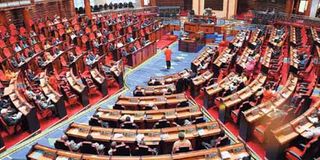Multipartyism: The weighty matter of Parties Bill

National Assembly during a past session.
Dar es Salaam. The stage seems to be already set for the general election next year following the passage of the controversial Political Parties Bill in the National Assembly. Critics of this proposed piece of legislation argue that it is anachronistic, invokes fear, and turns Tanzania into a de fact mono-party state.
Despite pressure from the opposition, civil society organisations, rights groups and members of the general public, the bill, which seeks to amend the Political Parties Act of 1992, was passed by Members of Parliament as if it were aimed at ratifying an armistice between two warring parties.
Coming as it does in the midst of deep political polarisation, analysts and political pundits are convinced that the bill sounds the death-knell to the country’s infant multi-party democracy.
A professor of democracy at the UK-based University of Birmingham and author of How to Rig an Election, Prof Nic Cheeseman, said he was saddened to see political events unfold as they do now in the country.
The passage of the bill, he said in a Twitter post, was “a slow and painful death [of democracy] by a thousand cuts. If current trends continue, there will not be much left by the next election.”
Referring to ACT-Wazalendo party leader Zitto Kabwe’s statement comparing the party bill with the 1933-Enabling Act introduced by Adolph Hitler during Nazi Germany, Rachael McLellan, a PhD student at the US-based Princeton University, said though the comparison may sound extreme she was still convinced that it was not completely unfair.
“[The bill] is intended to make it all but impossible to obey the law [itself] and [working as] an opposition party,” said McLellan in a Twitter post.
All in all, the passage of the bill has only served to butress arguments made by authors Daniel Ziblatt and Steven Levitsky on how legal mechanisms can be used to kill democracy.
Writing in their book How Democracies Die, the authors argued that many government efforts to subvert democracy are ‘legal’ in the sense that they are approved by the legislature or accepted by the courts of a respective country.
Disquieting provisions
But to what extent are these fears justified? Could it be a false alarm ahead of the general election late next year?
Granted, there are very disquieting sections of the bill, which may arguably portend ill not just to the opposition parties, but also to the whole concept of political pluralism, which is so cherished in the Constitution.
Take a provision in the bill that gives the Registrar of Political Parties the power to monitor intra-party elections and nomination process, for example.
This gives government an opportunity to choose who the ruling party must contest in elections. This is even more worrying considering the fact that the Registrar is appointed by the President, who doubles as the chairperson of the ruling party.
It’s understandable that the opposition is afraid that the Registrar, whose office has already been accused of bias and involvement in shenanigans to destabilise the opposition, may disapprove of the nomination of their presidential candidate if he is convinced that the chosen person may pose a significant challenge to his appointing authority’s political party.
The bill also requires every political party to maintain updated registers for members of the party -- and he may anytime require it submitted to his office. Failure to comply will lead to the political party’s suspension.
Now, it is known that documents such as these are very important when it comes to political party plans and strategies for winning an election in a particular constituency. In other words, the number of party members is the political party’s capital and treasure.
How will the opposition be so sure that the Registrar’s access to this information cannot be used against them by the ruling party? That assurance is nowhere to be seen in the bill. Political analysts agree that 2015 was a remarkable year in the history of Tanzania’s multi-party democracy.
It was the first time that four opposition parties formed a coalition that enabled them to field one presidential and parliamentary candidate.
This posed a serious challenge to the ruling party.
But with the passage of the bill, it is unlikely that the same can happen in the coming general election.
The bill has made it near impossible for political parties to form a coalition for it requires them to opt for a merger.
Confronted with that option, political parties will definitely consider the idea of party coalition less preferably.
The bill also requires anyone wishing to conduct civic education or any kind of capacity building training to a political party to inform the Registrar before doing so.
The Registrar will have the last say. Organisations like the International Republican Institute (IRI) and National Democratic Institute (NDI) from the US, or Friedrich Ebert Foundation (FES) and Konrad Adenauer Foundation (KAS) from Germany, will be among those affected given their long history of being involved in capacity building for political parties locally.
Opposition parties fear that this provision is aimed at denying them access to training from their allies across the world in relation to party ideology and other political strategies.
Not the least of all the concerns, fears will heighten that the bill gives the Registrar the weapon to meddle in their internal affairs and foment divisions and conflict. The Registrar has always denied allegations of interference.
But the opposition has been fiercely criticising a provision empowering the Registrar to demand for any information about political parties from their leaders or members.
Given the fact that a political party is a formal institution, the leaders of the opposition insist that all information should be requested from the party’s secretary general for her is the centre of all party’s correspondence.
The fight continues
Three opposition politicians filed a case at the High Court of Tanzania under a certificate of urgency on December 20, banking on an argument that the proposed amendments were attempts by the government to exclude opposition parties from engaging in political activities.
However, on January 14 the High Court quashed the case and the politicians instructed their lawyers to file another case the same day to challenge Section 8 (3) of the Basic Rights and Duties Enforcement Act used by the court to drop their case.
Asked what they would do if Parliament passes the bill, opposition parties and civil society organisations leaders responded that they were determined to challenge the bill at the court of law.
Speaking shortly after the High Court had dropped their case, Mr Kabwe said: “We respect the judgement, but we will keep on fighting for our rights through the court because we trust it.”




